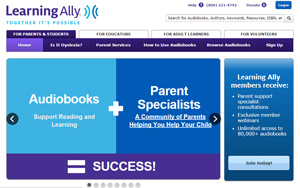 When we talk about dyslexia, we often talk about intervention, but an equally important part of helping a student with dyslexia is providing accommodations. Accommodations are not meant to replace intervention, but are meant to provide the student access to the materials they are capable of understanding, in a format other than eye reading. Three of the five apps described below are considered accommodations, one is a great game to help improve the skills that those with dyslexia often need to strengthen, and one is to help students understand English orthography.
When we talk about dyslexia, we often talk about intervention, but an equally important part of helping a student with dyslexia is providing accommodations. Accommodations are not meant to replace intervention, but are meant to provide the student access to the materials they are capable of understanding, in a format other than eye reading. Three of the five apps described below are considered accommodations, one is a great game to help improve the skills that those with dyslexia often need to strengthen, and one is to help students understand English orthography.
Dyslexia Toolkit: This app is made for those with dyslexia by those with dyslexia. It is meant to provide practical, everyday assistance to those who struggle with day-to-day activities. Take a picture of a piece of writing and the app will read it aloud. For those who need some assistance with menus, directions, and reading what comes up while out and about, this is a perfect solution. As a special touch, backgrounds are optional. The user does have to pay for this service with purchased tokens.
Learning Ally (previously the Recording for the Blind and Dyslexic): This is an enormous selection of audio books that can be downloaded to any device. Learning Ally provides books from K-12 curriculum as well as pleasure reading books. They set themselves apart by having humans read the books instead of a computer voice. Learning Ally also provides services for parents and the community. They do require a nominal yearly fee and the user needs to have a documented print-based disability.
Bookshare (Read2GO): Like Learning Ally, Bookshare is a place to go for audio books. They have a vast collection of curriculum and pleasure reading books and you can control the speed of the audio, as well as choose to highlight each word as it is being read. Bookshare is free to those who have a documented print disability.
Etymonline: While this is a website, not an app, it is an important tool to use as we need a place to go to find out why words are spelled a particular way. This website provides the history (etymology) of words. If you have students who are having trouble remembering how to spell the word “people,” take a trip to Etymonline and you will learn it is related to the word “population” and voila, the “o” in people makes sense. Along with learning about spelling, your students will learn how history, Latin, Greek, French, and Old English have helped our language evolve. It’s far more than just a spelling lesson.
Dyslexia Quest: This is a fun, fun, fun game those who are struggling with reading will love. The idea is there is a Yeti at the top of the mountain and to get there you have to complete five reading skills activities including phonological awareness, working memory, processing speed, visual sequential memory, auditory sequential memory, and visual memory. The game also tracks progress and differentiates the game based on age.
Accommodations in the form of apps and websites are tools allowing those with dyslexia to access information they need to succeed. They can be successful in anything they choose to do, with the right set of tools. These apps are just a few to get started.
 Kelli Sandman-Hurley (dyslexiaspec@gmail.com) is the co-owner of the Dyslexia Training Institute. She received her doctorate in literacy with a specialization in reading and dyslexia from San Diego State University and the University of San Diego. She is a trained special education advocate assisting parents and children through the Individual Education Plan (IEP) and 504 Plan process. Dr. Kelli is an adjunct professor of reading, literacy coordinator and a tutor trainer. Kelli is trained by a fellow of the Orton-Gillingham Academy and in the Lindamood-Bell, RAVE-O and Wilson Reading Programs. Kelli is the Past-President of the San Diego Branch of the International Dyslexia Association, as well as a board member of the Southern California Library Literacy Network (SCLLN). She co-created and produced “Dyslexia for a Day: A Simulation of Dyslexia,” is a frequent speaker at conferences, and is currently writing “Dyslexia: Decoding the System.”
Kelli Sandman-Hurley (dyslexiaspec@gmail.com) is the co-owner of the Dyslexia Training Institute. She received her doctorate in literacy with a specialization in reading and dyslexia from San Diego State University and the University of San Diego. She is a trained special education advocate assisting parents and children through the Individual Education Plan (IEP) and 504 Plan process. Dr. Kelli is an adjunct professor of reading, literacy coordinator and a tutor trainer. Kelli is trained by a fellow of the Orton-Gillingham Academy and in the Lindamood-Bell, RAVE-O and Wilson Reading Programs. Kelli is the Past-President of the San Diego Branch of the International Dyslexia Association, as well as a board member of the Southern California Library Literacy Network (SCLLN). She co-created and produced “Dyslexia for a Day: A Simulation of Dyslexia,” is a frequent speaker at conferences, and is currently writing “Dyslexia: Decoding the System.”